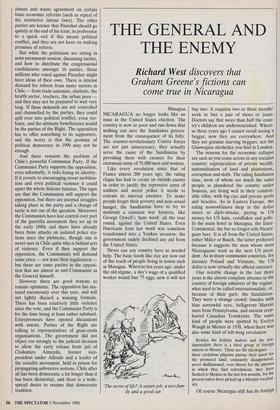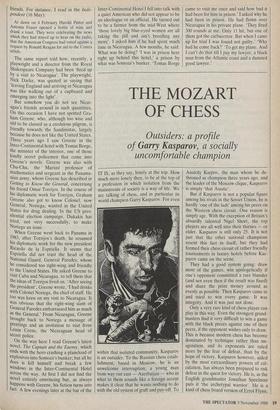THE GENERAL AND THE ENEMY
Richard West discovers that
Graham Greene's fictions can come true in Nicaragua
Managua NICARAGUA no longer looks like an issue in the United States election. The country is now so poor and run down that nothing can save the Sandinista govern- ment from the consequence of its folly. The counter-revolutionary Contra forces are not just unnecessary; they actually serve the cause of the Sandinistas by providing them with excuses for their enormous army of 70,000 men and women.
Like every revolution since that of France almost 200 years ago, the ruling clique has had to create an outside enemy in order to justify the repressive army of soldiers and secret police it needs to contain its internal enemies. To make people forget their poverty and now actual hunger, the Sandinistas have to try to maintain a constant war hysteria, like George Orwell's 'hate week' all the year round, against the United States. Even Hurricane Joan last week was somehow transformed into a Yankee invasion; the government rudely declined any aid from the United States.
Never can any country have so needed help. The basic foods like rice are now out of the reach of people living in towns such as Managua. Whereas ten years ago, under the old regime, a day's wage of a qualified worker would buy 75 eggs, now it will not
•
`The secret of life? A secure job, a nice fam- ily and a good car.' buy two. It requires two or three months' work to buy a pair of shoes or jeans. Doctors say that more than half the coun- try's children are undernourished. Where- as three years ago I cannot recall seeing a beggar, now they are everywhere. And they are genuine starving beggars, not the Glaswegian alcoholics you find in London.
The masons for the economic collapse are such as you come across in any socialist country: expropriation of private wealth, nationalisation of land and plantations, corruption and sloth. The ruling Sandinista class, most of whom are much the same people as plundered the country under Somoza, are living well in their comfort- able villas, with big cars and private pools and beaches. As in Eastern Europe, the ruling nomenklatura shop in the dollar stores or diplo-tiendas, paying in US money for US ham, cornflakes and gello. In the main hotel in Managua, the Inter- Continental, the bar no longer sells Nicara- guan beer. It is all from the United States, either Miller or Busch, the latter preferred because it suggests the man whom most Nicaraguans want as the next US presi- dent. As in many communist countries, for instance Poland and Vietnam, the US dollar is now virtually the official currency.
One notable change in the last three years is the almost complete absence in the country of foreign admirers of the regime, what used to be called internationalists, or, because of their garb, the Sandalistas. They were a strange crowd: Swedes with blue sorrowful eyes, belligerent Marxist nuns from Pennsylvania, and ancient crop- haired Canadian Trotskyists. The same kind of people were spotted by Evelyn Waugh in Mexico in 1938, when there was also some kind of left-wing revolution: Besides the holiday makers and the sen- timentalists there is a third group of foreign visitors to Mexico. These are the ideologues • • these credulous pilgrims pursue their quest for the promised land; constantly disappointed, never disillusioned, ever thirsty for the phrases in which they , find refreshment, they have flocked to Mexico in the last few months, for the present rulers have picked up a Marxist vocabul- ary.
Of course Nicaragua still has its foreign friends. For instance, I read in the Inde- pendent (16 May):
At dawn on 4 February Harold Pinter and Antonia Fraser opened a bottle of wine and drank a toast. They were celebrating the news which they had stayed up to hear on the radio, that the American Congress had voted against a request by Ronald Reagan for aid to the Contra rebels.
The same report told how, recently, a playwright and a director from the Royal Shakespeare Company had been 'fired up by a visit to Nicaragua'. The playwright, Nick Darke, was quoted as saying that `leaving England and arriving in Nicaragua was like walking out of a cupboard and emerging into the light'.
But somehow you do not see Nicar- agua's friends around in such quantities. On this occasion I have not spotted Gra- ham Greene, who, although too wise and old to be classed as a credulous pilgrim, is friendly towards the Sandinistas, largely because he does not like the United States. Three years ago I saw Greene in the Inter-Continental hotel with Tomas Borge, the minister of the interior, one of those kindly secret policemen that come into Greene's novels. Greene was also with Chu-Chu, the Marxist professor of mathematics and sergeant in the Panama- nian army, whom Greene has described in Getting to Know the General, concerning his friend Omar Torrijos. In the course of his diplomatic work for Torrijos, Graham Greene also got to know Colonel, now General, Noriega, wanted in the United States for drug dealing. In the US pres- idential election campaign, Dukakis has tried, not very successfully, to make Noriega an issue.
When Greene went back to Panama in 1983, after Torrijos's death, he resumed his diplomatic work for the new president Ricardo de la Espriella. It seems that Espriella did not trust the head of the National Guard, General Paredes, whom he considered too right-wing and friendly to the United States. He asked Greene to visit Cuba and Nicaragua, to tell them that the ideas of Torrijos lived on. 'After seeing the president', Greene wrote, 'I had drinks with Colonel Noriega, the chief of staff. He too was keen on my visit to Nicaragua. It was obvious that the right-wing slant of General Paredes embarrassed him as much as the General.' From Nicaragua, Greene brought back to Noriega a message of greetings and an invitation to visit from Lenin Cerna, the Nicaraguan head of secret police.
On the way here I read Greene's latest novel, The Captain and the Enemy, which ends with the hero crashing a planeload of explosives into Somoza's bunker; but all he does is kill himself and break a few windows in the Inter-Continental Hotel across the way. At first I did not find the novel entirely convincing but, as always happens with Greene, his fiction turns into fact. A few evenings later at the bar of the
Inter-Continental Hotel I fell into talk with a quiet American who did not appear to be an ideologue or an official. He turned out to be a farmer from the mid-West where `those lovely big blue-eyed women are all taking the pill and ain't breeding any more'. I asked him if he had spent much time in Nicaragua. A few months, he said. What was he doing? 'I was in prison here right up behind this hotel,' a prison by what was Somoza's bunker. 'Tomas Borge
came to visit me once and said how bad it had been for him in prison.' I asked why he had been in prison. He had flown over Nicaragua in his private plane. 'They fired 300 rounds at me. Only 11 hit, but one of them got the carburettor. But when I came up for trial I was found not guilty.' Why had he come back?' To get my plane. And I can't do that till I pay my lawyer, a black man from the Atlantic coast and a damned good lawyer.'



































































 Previous page
Previous page